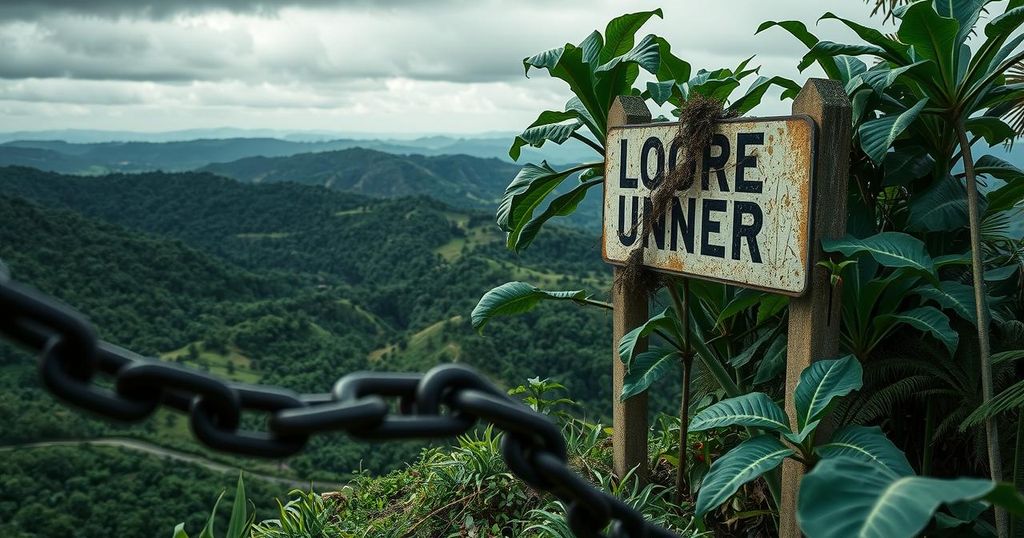M23’s Advance in DRC Raises Concerns Over Renewed Regional Conflict
The M23 rebel group’s capture of Goma in the DRC, allegedly backed by Rwanda, threatens to reignite conflicts that have claimed millions of lives. The continued instability highlights the Congolese government’s struggles with ineffective military forces and regional geopolitics driven by mineral wealth. As international support for peacekeeping dwindles, local authorities must take charge to secure a stable future in the region.
In early October, the M23 rebel group, composed primarily of Tutsis, captured Goma, the largest city in Eastern Democratic Republic of Congo (DRC), reportedly with Rwandan support. The M23 claims its mission is to protect Congolese Tutsis from Hutu militias associated with the Rwandan genocide. Continuing their advances, M23 insurgents are now moving towards Bukavu, another strategic city to the south.
Since taking Goma, M23 has established control over vital infrastructure, such as the airport and border checkpoints. This unrest has resulted in over 3,000 fatalities, including 20 peacekeepers from various African nations, and displaced approximately 500,000 civilians. Residents in Goma have expressed their frustrations towards Western embassies for failing to address the situation, while Congolese authorities have condemned Rwanda’s involvement as an act of war.
The DRC has been embroiled in conflict since 1996, witnessing two major wars fueled by Rwanda-backed insurgent factions. These wars precipitated the fall of President Mobutu and led to the destabilization of successive governments in Kinshasa, drawing in multiple African nations and resulting in the loss of more than six million lives.
Three primary factors underpin the ongoing conflict. Firstly, the Congolese government’s struggle to control M23 and other armed groups is evident. Its military, beset by corruption and inefficiency, struggles to provide security, often resorting to costly foreign mercenaries.
Secondly, the aftermath of previous conflicts continues to influence regional dynamics. According to expert Jason Stearns, mineral wealth drives strategic opportunism among various state and non-state actors, making the DRC’s extensive natural resources a focal point for illegal exploitation.
Thirdly, Rwanda’s alleged involvement remains a contentious issue. Fred Bauma of the Ebitoli Institute argues that M23’s power is largely sustained by Rwandan support and advocates for intervention from major powers to limit Rwanda’s influence in the DRC.
The UN peacekeeping presence in the DRC has been significantly reduced, raising concerns about future stability. The Security Council recently voted to withdraw troops, which some fear will worsen the chaotic situation on the ground. Similarly, attempts by the East African Community to stabilize the region through troop deployments have faced accusations of complicity with rebel factions, leading to their withdrawal.
Recently, the Southern African Development Community has initiated a mission to assist the Congolese military against armed groups. However, heavy losses in their engagements with M23 within a short timeframe compel a reconsideration of their strategies. As global focus shifts to other crises, the potential for renewed conflict in the DRC looms large.
The situation in the DRC necessitates that local authorities take decisive action toward stability, rather than rely solely on international intervention that may be waning. Without concerted efforts, the cycle of conflict threatens to repeat itself, further deteriorating the region’s fragile peace.
The complex conflict in the Democratic Republic of Congo has historical roots, marked by extensive violence and external interventions. Key issues include the inability of the Congolese state to maintain security, the lasting impacts of prior wars that involve regional powers, and the significant influence of valuable minerals that fuel ongoing strife. The evolving role of various peacekeeping missions and international interests complicates the path to resolution, highlighting the urgent need for effective local governance and conflict management.
The resurgence of M23 in Eastern DRC poses a severe risk of escalating regional conflict, mirrored by historical precedents of violence and instability. With a weak military and foreign interests competing for mineral resources, local authorities must urgently address these challenges to prevent further chaos. As global attention wanes, the responsibility falls on the Congolese government and its allies to forge a path toward stability and peace.
Original Source: www.deccanherald.com




Post Comment